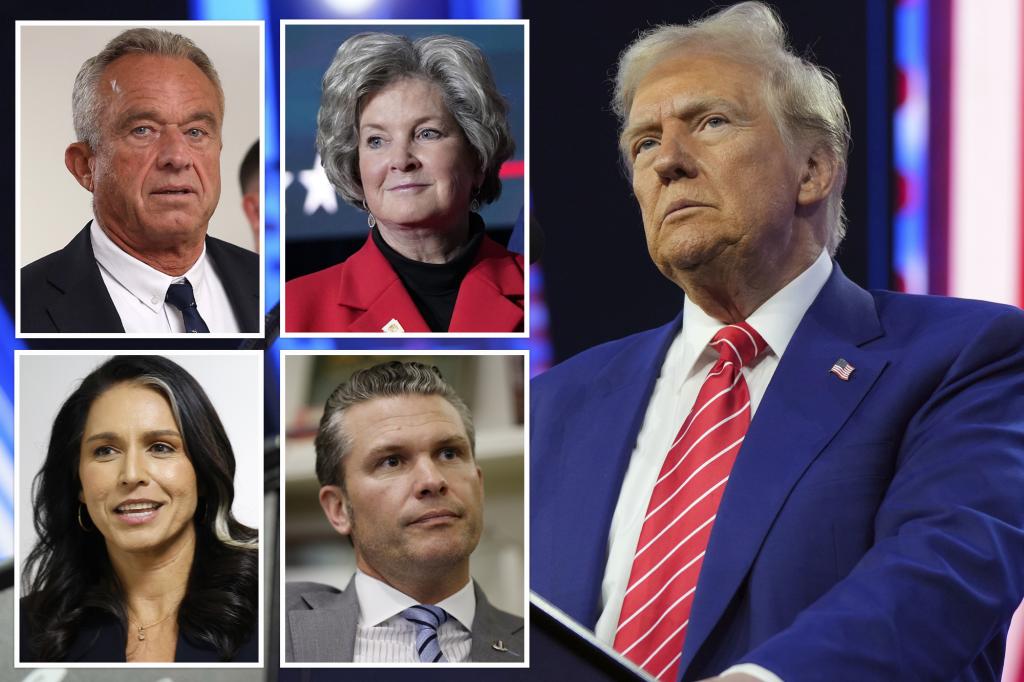The incoming Trump administration, under the direction of Chief of Staff Susie Wiles, has implemented a strict social media silence for all nominees pending Senate confirmation. This directive, reiterated in a memo obtained by The Post, underscores the administration’s emphasis on message control and the avoidance of any premature pronouncements or controversies that could jeopardize the confirmation process. Wiles stressed that no member of the transition team or any nominee speaks for the President-elect or the United States, and therefore, all social media posts must be vetted and approved by the incoming White House counsel. This proactive measure aims to maintain a unified and disciplined front as the nominees navigate the often turbulent waters of Senate confirmation hearings. While acknowledging the enthusiasm of the incoming team, Wiles’s directive emphasizes the seriousness and delicacy of the confirmation process.
The timing of this memo coincides with the commencement of Senate confirmation hearings, scheduled to begin the following week. These hearings are expected to be particularly contentious given the narrow Republican majority in the Senate. A united Democratic opposition to any nominee, coupled with the defection of just four or more Republican senators, could derail a confirmation. Therefore, minimizing any potential controversies or missteps, especially those originating from social media activity, is paramount. The memo serves as a preemptive measure to avoid any self-inflicted wounds that could undermine a nominee’s chances. The emphasis on message discipline and the avoidance of unauthorized pronouncements highlights the administration’s recognition of the high stakes involved in the confirmation process.
While the memo’s timing is proximate to a recent social media controversy involving figures associated with the Department of Government Efficiency (DOGE), a transition source clarified that the directive is not a direct response to this incident. The controversy centered on discussions about H-1B visas, sparked by Elon Musk and Vivek Ramaswamy, prominent figures associated with DOGE. However, as DOGE is not an official government department requiring Senate confirmation, its members are not subject to the same social media restrictions as presidential nominees. The source emphasized that the memo served as a timely reminder of the existing guidance for nominees as their confirmation hearings approached. This clarification distinguishes between the roles and responsibilities of those within the formal administration requiring Senate approval and those outside of it.
The upcoming confirmation hearings are anticipated to be particularly challenging for several of Trump’s nominees. Some, like former Representative Matt Gaetz, who was initially tapped for Attorney General, have already withdrawn their nominations due to anticipated lack of support in the Senate. Others, such as Defense Secretary nominee Pete Hegseth, face scrutiny over past allegations of misconduct. Despite these challenges, most nominees, adhering to Wiles’ directive, have maintained a low profile on social media. This online silence reflects the seriousness with which the nominees are approaching the confirmation process. The absence of public pronouncements suggests a concerted effort to avoid any missteps that could further complicate their confirmation bids.
The social media silence also extends to nominees who might face especially tough questioning during their hearings, including former Democrats Robert F. Kennedy Jr., nominated for Health and Human Services, and Tulsi Gabbard, nominated for Director of National Intelligence. Their silence underscores the strategic importance of careful navigation through the confirmation process, particularly for those with potentially controversial past affiliations or positions. This deliberate avoidance of public commentary suggests a recognition of the heightened scrutiny they face and a strategic decision to avoid any pronouncements that could be used against them during the hearings.
In the weeks leading up to the hearings, nominees have been engaged in closed-door meetings with senators from both parties, working to secure support for their confirmations. These behind-the-scenes efforts underscore the crucial role of personal lobbying and relationship-building in the confirmation process. The willingness of nominees to engage directly with senators demonstrates their commitment to securing the necessary votes for confirmation. Even Hegseth, whose nomination appeared to be in jeopardy, has benefited from these direct engagements, garnering support from key senators like Joni Ernst, who cited “encouraging conversations” as a basis for her backing. This underscores the importance of personal diplomacy and direct engagement in swaying senatorial opinion. The social media silence, coupled with the active pursuit of senatorial support, demonstrates a comprehensive strategy aimed at navigating the complexities of the confirmation process.

